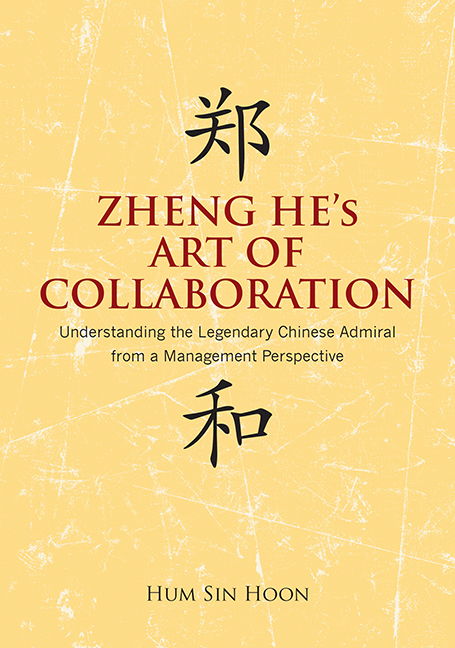 Zheng He's Art of Collaboration
Zheng He's Art of Collaboration Why Pay Attention to this Fifteenth-Century Chinese Eunuch?
from PART I - ZHENG HE AND HIS MESSAGE
Published online by Cambridge University Press: 21 October 2015
INTRODUCTION
With the rise of Asia and China economically, much interest has been put on learning about doing business and practising management in this part of the world. And while much writing have focused on the current realities and issues that businesses are grappling with, there is also significant attention paid to learning about these realities through the writings of ancient wisdom, especially when such wisdom may be embedded in lesser known texts and sages from the Far East.
In this context, learning about doing business from the classic Chinese writings of Sun Zi and Confucius have been most popular. The classic Art of War as articulated by fourth-century-BC Sun Zi, for example, has long been translated into English and expounded by a whole host of modern-day authors seeking to draw inspiration and applications from it for modern-day business practices. More recently, Yu Dan's 10-million-copy bestseller Confucius from the Heart has been translated into English to make the wisdom of sixth-century-BC Confucius even more widely available.
In this book, we follow this trend by introducing to the modern world the fifteen-century-AD-Chinese-eunuch-Muslimadmiral Zheng He, also variously known as Cheng Ho or Ma He. But who is this person and why should we pay attention to him? Sure, he is no ancient-early-century-BC eastern sage of the order of Sun Zi or Confucius; he had also not penned his thoughts and practices for the benefit of posterity; writings about him in English have been limited; and outside of China, he is hardly known. Surprisingly, in Southeast Asia (especially in Malacca), South Asia (India and Sri Lanka), the Middle East (Saudi Arabia and the surrounding Muslim states), and Eastern Africa (Somalia and Kenya), Zheng He's legacy exists even today. Within China itself, Zheng He is now being regarded as a national hero and is held up as the trailblazer of the modern open-door policies that have brought China to today's world stage. In the mass media, Zheng He's emperor-decreed early-fifteen-century-AD exploits in his seven grand voyages across the uncharted waters from China to Africa have been dramatized as an epic forty-episode TV drama serial that has gained a wide popular following throughout this region.
To save this book to your Kindle, first ensure no-reply@cambridge.org is added to your Approved Personal Document E-mail List under your Personal Document Settings on the Manage Your Content and Devices page of your Amazon account. Then enter the ‘name’ part of your Kindle email address below. Find out more about saving to your Kindle.
Note you can select to save to either the @free.kindle.com or @kindle.com variations. ‘@free.kindle.com’ emails are free but can only be saved to your device when it is connected to wi-fi. ‘@kindle.com’ emails can be delivered even when you are not connected to wi-fi, but note that service fees apply.
Find out more about the Kindle Personal Document Service.
To save content items to your account, please confirm that you agree to abide by our usage policies. If this is the first time you use this feature, you will be asked to authorise Cambridge Core to connect with your account. Find out more about saving content to Dropbox.
To save content items to your account, please confirm that you agree to abide by our usage policies. If this is the first time you use this feature, you will be asked to authorise Cambridge Core to connect with your account. Find out more about saving content to Google Drive.